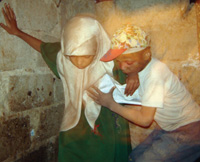
Road accidents hamper locals’ lives [Archives:2008/1135/Reportage]
March 6 2008
 |
As a result of highway accidents, citizens of Bani Hiwat, a district in Sana'a governorate, are keeping their children from school due to increasing worries about them crossing the two-lane highway in order to get there.
In response to this, local residents have constructed roadblocks in an effort to make drivers slow down, but the makeshift roadblocks are causing drivers to wreck and overturn their vehicles, sometimes harming nearby pedestrians or onlookers.
In Bani Hiwat, three homes near each other all house victims of such highway incidents. Ten-year-old Ibtihal Mohammed Najee became the victim of a speeding driver on the highway. She had been a school first-grader before the accident took the use of her legs. A car struck Ibtihal during Ramadan while she was running an errand for her mother to a nearby store in Bani Hiwat.
The youth has been confined to her home for the past four months since her accident. While she has had an operation on her leg, she can't continue her treatment, as her family barely has enough money to support themselves day to day.
Ibtihal lives with her family of 10 headed by her mother, Amina Riziq, since her father died four years ago.
Her mother works with farmers outside of Sana'a to harvest fruits and vegetables, arising before sunrise at 5 a.m. and returning home just before sunset. For this, she earns only YR 300 a day.
Their house consists of only two rooms and a bathroom – no kitchen. Riziq rents the home for YR 4,000 a month without electricity or water. Unable to afford even medicine for her, Ibtihal's mother, brothers and sisters help her shower, dress and move about the house. Since she no longer can attend school, Ibtihal spends her time drawing and dreaming of having enough money to buy colorful pens and good paper for her drawings.
Sumayah Hassan
Safiyah Al-Samah, another resident of Bani Hiwat, has dark circles around her eyes due to lack of sleep and continuous crying. In her mid-20s, the illiterate mother of eight still grieves the loss of her 7-year-old daughter Sumayah Hassan, who was killed in an accident a few weeks ago. “A qat-chewing male driver who was not watching the road, struck and killed my daughter and then drove off. He didn't even take her to the hospital!” the mother explained.
As a reaction to Sumayah's fatal accident, Al-Samah has kept another of her daughters, 9-year-old Jihad, from attending school. The second-grader says she's afraid of dying like her sister and doesn't want to attend school.
Three houses down from Al-Samah is another family affected by highway incidents, as two of Khizaran Mohammed Gauid's children, Sumayah and Luqman, had car accidents on the same . “I hate all taxi drivers! I'm afraid to cross the road,” Sumayah declares.
While Bani Hiwat residents realize that it's illegal to build roadblocks, they maintain that it's the only thing they can do to prevent their children from dying in such highway incidents.
Accidents do happen, despite denials by area police
Abdullah Ali, a merchant at a nearby shop in Bani Hiwat, once witnessed four accidents on that particular road within a week. He also saw a horrifying accident where a driver lost control of his vehicle, swerved off the road and hit a man breakfasting at a roadside restaurant.
“Roadblocks are illegal because they cause problems, especially at night when drivers drive fast and don't see them,” explains Yahya Shubail, general manager of Traffic Administration in Sana'a, a government body at the Ministry of Interior. “This causes their vehicles to overturn. The Yemeni government is seeking to prevent and remove any roadblocks via the Public Works Ministry.”
A source from the Transportation Ministry's Traffic Department reports that the capital city of Sana'a witnessed 5,549 traffic accidents last year.
The Yemen Times contacted the Bani Hiwat Police Station, but authorities there denied the existence of any roadblocks on area highways and further refused comment on any accidents or injuries involving the highway or the roadblocks. Station manager Kamal Shalwan indicated that if there are any roadblocks, they will be removed.
However, Bani Hiwat neighborhood sheikh Askar Asel explained, “[We had] four accidents in 2007 and one so far in 2008. Area residents erect roadblocks because of the increasing number of accidents and because that road is filled with children and old women. After Sumayah [Hassan]'s death, they created two dirt roadblocks, but those vanished over time.” While Asel noted that area police sometimes get angry about the makeshift roadblocks, he said they haven't done anything about them recently. Additionally, there are no road signs warning drivers to slow down.
“Those who've been hurt by these makeshift roadblocks made a formal statement to the Public Works Office indicating that the roadblocks can cause accidents involving both locals and drivers' vehicles,” explained Najeeb Al-Korimi of the Public Works Ministry's maintenance office. To improve safety for both children and drivers, area residents of Bani Hiwat suggest either erecting signs along the road to warn oncoming vehicles or constructing concrete overpasses for residents to cross the road without worry.
——
[archive-e:1135-v:18-y:2008-d:2008-03-06-p:report]


